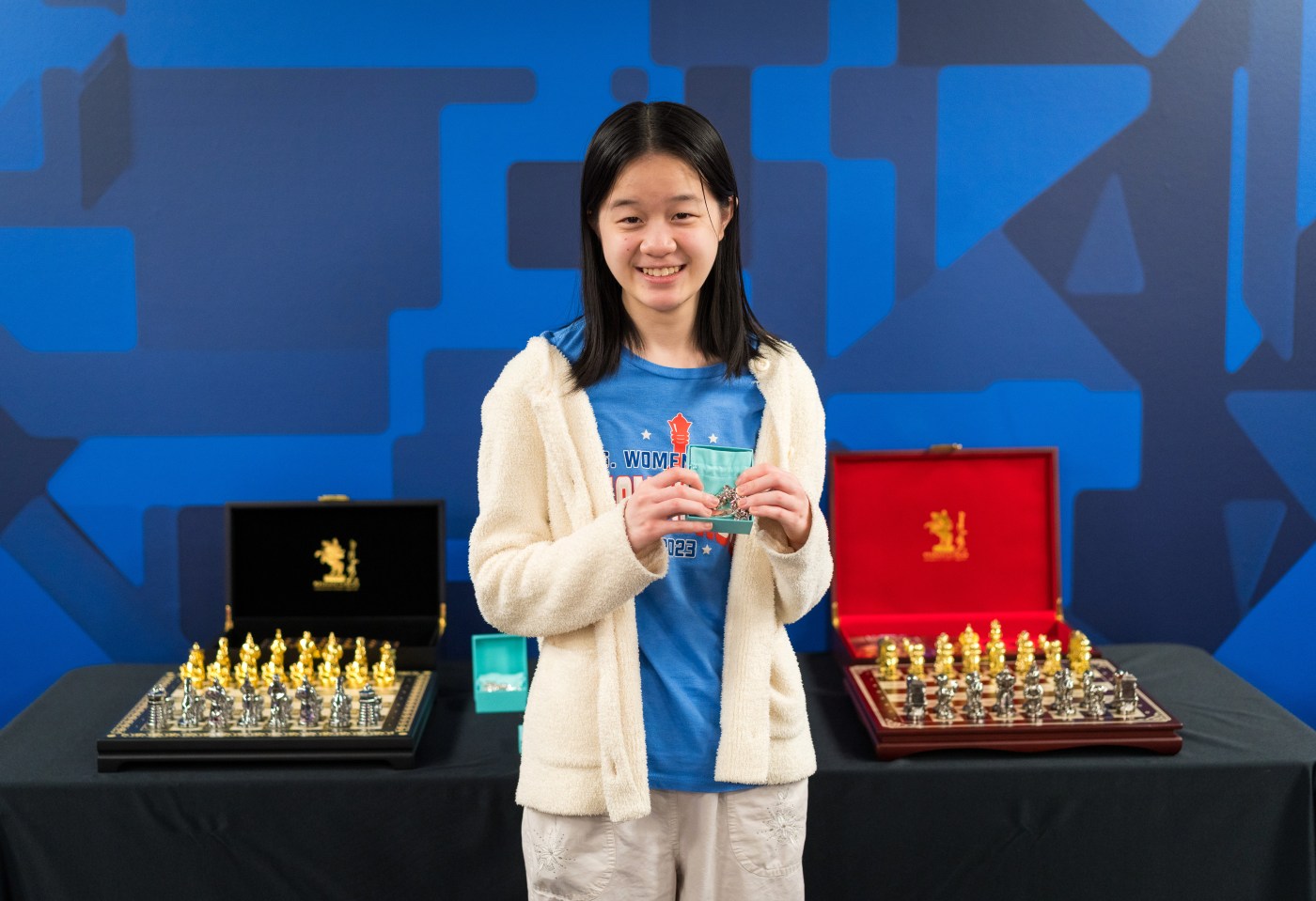
Alice Lee, a 14-year-old North Oaks chess master, demonstrates discipline in the game of high strategy
Not everyone gets to meet their idols — or compete against them.
When Alice Lee was growing up, she watched Irina Krush, the first woman to earn the title of Grandmaster while playing for the United States. Alice, 14, of North Oaks never thought she would play chess against her, let alone win. But after falling behind in their match, Alice was able to defeat Krush 4-2 on the final day of the 2024 American Cup in St. Louis on March 21 with it coming down to the last moves.
Alice began playing chess at age 6, joining her older brother Linden at their school chess club. At age 8, Alice became a U.S. Chess Expert. At age 10, a U.S. Chess National Master. Now, at 14, she holds the title of International Master and Woman Grandmaster.
Despite these achievements at a young age, Alice always pursues persistence and discipline in her chess.
“I’m not really focusing on too much of the title as I am on improving, because with improvement comes better results naturally,” she said.
Alice became a U.S. Chess National Master before the COVID-19 lockdown in 2020. After the lockdown hit, she largely worked on school and learning math from Linden. She was able to complete nearly all of her high school math curriculum and practice competition math with her brother, who taught her patiently. Alice continued training with her chess coach at the time, but did not compete in any in-person chess activities for a year and a half, “freezing” her development.
Aleksandr Lenderman, an American chess Grandmaster and one of Alice’s previous coaches, was able to coach her out of that freeze, beginning in the summer of 2021. In the first year of training, she would stay consistent and train for one or two hours a day, something that made her stand out among most chess students. Alice received private lessons a few times a week, and solved puzzles and played training games on her own time.
By February 2022, Alice received an International Master norm, signifying she attained a high level, and came in second behind Krush, improving dramatically in the first seven months of Lenderman’s coaching in what he calls a “perfect storm.”
“It was the right place at the right time. Everything just kind of clicked for her,” Lenderman said. “Not only did she get much better in general, but also … everything was also going her way.”
‘Queen’s Gambit’
After watching the Netflix show “The Queen’s Gambit” in 2020 — which her mom, Vanessa Lee, watched first and censored for 10-year-old eyes — Alice was happy to see the increase in the popularity of chess. When she returned to in-person school in the fall of 2022, she saw her peers playing matches on computers in class, and more of her friends started learning how to play as well.
Tim Radermacher, the treasurer of the Minnesota State Chess Association and a friend of the Lee family, has seen membership of the MSCA grow to more than 400. When the pandemic subsided, people went from online chess to seeking in-person tournaments.
Radermacher, who has been playing chess for more than 50 years, sees some of himself in Alice and the other young players on the rise, and has played both against Alice and on a team with her, representing Minnesota at tournaments with Alice and her brother.
“It’s a little bit surreal, because I was a top chess player in my youth,” Radermacher said. “I used to be the young person that would beat all of the older masters and I was the up-and-coming player.”
Teaching the game
Alice now gives online chess lessons to girls ages 5 to 10 who are interested in playing chess or want to improve. Seeing more girls engaging in chess is exciting for her, as the game is male-dominated, and she recognizes the importance of girls who are studying to find a strong community of other girls like them.
Alice plans to continue giving lessons until she graduates from high school, and wants to show that girls can have impressive chess results, too.
Working with ChessKid.com, an online platform, she’s had the opportunity to do shows like “Alice’s Pawn Palace” and be a representative of the young chess community. She wants to keep improving.
“I am also a student, and I think I’ll always have something I can learn from someone else as well,” she said.
‘She didn’t have this big ego’
When everything goes as planned in tournaments, Alice has a good day. When it doesn’t go as planned, she tries to not let bad results affect her, leaving every match with a cool demeanor. After a loss, she takes the pressure off of herself — and almost never loses two games in a row.
“I feel like there are other students who would just tilt. Once they lose a game, their tournament would almost be over, they just couldn’t handle that ego,” Lenderman said. “But Alice, she didn’t have this big ego ever.”
For a young girl, Alice demonstrates high emotional intelligence in her tournaments, while maintaining flexibility and a good listening ear to soak up knowledge from Lenderman and her other coaches.
Vanessa Lee, a psychologist specializing in human attention and memory, recognizes the demands of competitive chess. While some skills are “muscle memory” like how a basketball player shoots 3-pointers, the application is not always so straightforward.
Much of chess training for Alice is focused on studying moves, including learning new openings. When she encounters an opening she doesn’t know, she handles the unknown one step at a time.
“The most important part is that you have to constantly study,” Alice said. “It’s constantly being improved and new variations are found.”
An evolution in play
Radermacher, who grew up playing chess before it was available online, has seen the evolution of the way people play and the speed of online chess. Faster moves, digital clocks, studying on the computer, playing on the phone — more technology has led to quicker thinking by players and quicker games.
In 2019, Alice competed at the World Cadet Championship in the group Girls Under 10. Vanessa Lee recalls watching the game live on a video feed, as Alice won the last match to get her first of three World Championship gold medals for Team USA. Greeting her at the entrance, Vanessa saw her daughter delighted but calm — glad the competition was over.
“Alice has had some great results subsequently, but from that point on, I recognized her emotion after a great result — a sense of relief,” her mother said.
During tournaments, Alice can spend 10 hours a day on chess, with a few hours of preparation before games. Wake up, prepare, play, concentrate, sleep, repeat. For four to five days, Alice’s school work is saved for later as she focuses on the game and her next strategies.
In each match, each side receives 90 minutes with a 30-second increment for each move played by one side — so each game can last four to five hours in total. While her opponents think on their next move, Alice has time to refresh her mind elsewhere, sometimes spending more than 30 minutes on one move. The longest game she has played in lasted six hours.
For her more advanced tournaments, Alice and her mom often travel outside of the Midwest, frequenting both of the coasts, but she has also played in Canada, Poland, China, Hungary and Brazil. Her favorite places were Poland and Canada, but Alice said that is likely because she got good results in those tournaments.
Reading, cats and writing
When she’s not focused on chess, Alice spends time reading series like Harry Potter and Percy Jackson, playing with her cats, poetry or creative writing, and her favorite subject in school is English.
In five years, Lendermen sees Alice as either a chess Grandmaster, or a successful Ivy League college student, following in Linden Lee’s footsteps as a student at Yale University. No matter if Alice prioritizes chess or academics, Lenderman thinks her strong skills and determination will lead her to success.
“The most important factor is, Alice is simply very hard working,” he said. “She’s very disciplined.”
With support from her parents, coaches and the MSCA, Alice’s humility and balanced emotions when it comes to chess is one of the keys to her success.
“Her parents and her family have invested so much in that it’s not just the money, it’s the time — you’re gonna need it to become a way of life to get to this level,” said Radermacher.
Related Articles
MN Legislature clears Stillwater, Shakopee to create outdoor drinking ‘social districts’
At St. Paul’s Keg and Case: Five Watt Coffee out, Starcade staying
St. Mark Lutheran Church on St. Paul’s West Seventh Street to close after 126 years
Ruam Mit Thai officially reopens at Fifth and Wabasha streets in downtown St. Paul
Power restored to Stillwater Lift Bridge after nearly 6-hour outage


